Phoresis Read online
Page 2
When she was done, she went back to the previous barren furrow and attacked it. There was nothing to be found, at any depth she could reach. She went to the furrow before it, and tried again, stopping to remove the fragments of ice after each blow. There was a root not far below the surface—out of sight when she’d first looked, but the ice here could obscure anything.
By the time Freya had backtracked all the way to the fourth of the dirt-buried flowers, she’d exposed nine roots. She stopped to catch her breath, happy but bewildered. If the pattern continued, she’d have no hope of exposing every accessible root on the plateau before nightfall—which was glorious, but utterly perplexing. How could this much extra ice be anything but an obstacle? What was it that she didn’t understand?
“It’s not about how far the roots have grown,” Bridget argued. “It’s about how hot or cold they are. If you pile up a lot of extra ice above the plain, that’s going to trap the heat: if you dug down a couple of hand’s breadths from the top of your plateau, you’d find it was every bit as warm as if you did the same anywhere on the plain. So the root tip isn’t going to stop growing, just because it’s come a long way from the ocean. It will only stop when it’s cool enough.”
“That makes sense,” Freya conceded. “But it doesn’t explain everything. The top layer of ice on that plateau has more roots in it than anyone’s found on the plain. I can see why it might be the same, but…why more?” She looked around the table, trying to judge her friends’ moods; she didn’t want to annoy anyone by seeming to gloat about her find. But it was still too strange and wonderful to be treated as purely a matter of chance, requiring no further discussion.
Erna said, “You mentioned a lot of dirt in the furrows?”
“Yes.”
“That would trap the heat even more, wouldn’t it? And it would reflect less sunlight than bare ice.”
“Right.” Freya felt a little foolish now; everyone knew that dark objects grew warmer than lighter ones. “So maybe the real puzzle is why the furrows are so deep.” Given their shape, it wasn’t surprising that they filled up with dirt, but even if it would take eons for the whole plateau to be eroded away, it seemed odd that the wind hadn’t yet sandblasted the top of it flat.
“I wonder what happens when a root flower is buried in a little valley like that,” Gro mused. “I mean, it’s still giving off methane and water vapor, but how freely does it all escape?”
Hanna said, “The methane would pass right through the dirt, but I think most of the water vapor would freeze on the grains of sand.”
Freya looked at Gro, wondering if they were thinking the same thing. But if they were, Gro offered her the chance to speak first.
“The whole shape could be a kind of growth pattern,” Freya said. “The dirt in the furrows traps water vapor from the root flowers as it turns to ice. That ice piles up, the furrows grow into mounds, and all the dirt that blows in on the wind spills off them onto the old mounds—which are now valleys and furrows themselves. And so it all starts again.”
Hanna laughed. “So the roots keep re-burying themselves in ice made from the very water they’re trying to get rid of! Which means they’re raising the plateau higher and making their own job harder—but as long as there’s enough dirt around to keep them warmer than they want to be, they’ll keep trying to push their way up into the cold.”
Gro said, “If that’s really what’s happening, I don’t know if we should be surprised that it’s the first time we’ve seen anything like it—or surprised that the phenomenon isn’t so rare that no one’s ever witnessed it at all.”
Freya wasn’t sure that they’d solved the mystery, but she doubted they’d come up with a better explanation if they sat around talking all night. Every scrap of food had vanished from the table long ago, and they’d all have to rise at the usual time in the morning.
She said, “To be honest, I haven’t worked as hard as I did today since my first harvest. Whatever made the plateau the way it is, I’m going to need to get to sleep soon or I won’t be able to face it again tomorrow.”
Bridget said, “You do know that we’re all coming with you, to help?”
Freya glanced at the others, but they seemed to be in agreement. “What about your own patches?” she asked.
“We’ll return to them when the plateau’s done,” Hanna replied. “If that’s where the roots are, that’s where our time’s best spent. No one expects you to break your back trying to get through all the work up there, alone.”
As the five friends set off across the ice together, Freya wondered if her companions were sufficiently awake yet to hear the wild thoughts that had kept her from sleep. She wasn’t even sure that she was in any state herself to decide what was worth repeating. As she’d lain on the blankets with her limbs aching, picturing the roots that stretched down to the buried ocean beneath her, the ideas that flowed through her head had seemed urgent and compelling—for all the uncertainties, and all the questions they raised. By daylight, the case was not so clear.
But when the blue ice of the plateau came into sight ahead of them, she realized that she had no hope of remaining silent all day, and it would be better to speak and be ridiculed now than to interrupt her friends when they were trying to work.
“If we placed mounds of black sand over the ice in the right pattern,” she asked, “do you think we could grow a plateau like this somewhere else?”
“I don’t see why not,” Bridget replied, managing to sound both intrigued and annoyed—as if she resented being forced to think about anything when the sun had barely cleared the horizon, but found the idea too enticing to ignore. “If you covered a big enough area, there’d probably be some roots positioned in the right place to get things started. It might take a while, but maybe it would be worth it, just to be ready for the next solar flares.”
“I’m thinking about more than the flares,” Freya confessed. “With the natural version, in the end most of the dirt will get stuck in the ice or blown away…but if people were actively tending the surface, who knows how high we could make the plateau?”
Gro said, “I think I know where you’re heading with this.”
“You do?” Freya waited, hoping to be spared the humiliation of having to spell it out herself if Gro had already decided that the idea was preposterous.
“Raise a tall enough mountain,” Gro guessed, “and the sheer weight of it will start to create new fractures. What better way to encourage more geysers?”
Freya wasn’t sure how to reply. If it was true that the ice would crack all the way to the ocean under the kind of load she was imagining, that would be the perfect outcome. But it would be dishonest of her to take credit for it. It wasn’t what she’d had in mind at all.
“That might happen,” she said. “But can we be sure that it would?”
Hanna said, “That depends on how long you can keep adding more ice.”
“Suppose we can coax the roots into doing the job for as long as we like,” Freya replied. “Keep the tips warm, so they can’t tell that they’re already high above the surface, and keep capturing all the water vapor they put out.”
Hanna grunted irritably. “If there’s no limit to how high you go, then of course the mountain’s going to break the ice eventually. You might as well pick a number, tell me to start counting, then ask if I’ll ever reach a number greater than yours.”
Erna said, “That’s not true.”
“It’s basic arithmetic!” Hanna retorted.
“It’s basic arithmetic that counting takes you past any given number,” Erna agreed, “but the comparison is false. Just because the height of a mountain increases without bounds, that doesn’t mean its weight will do the same.”
Hanna was silent for a while, then she conceded, “You’re right.”
Bridget said, “What?”
“Gravity is stronger close-up,” Hanna replied. “The farther you go above the world, the weaker its pull will be.”
“Yes,�
�� Bridget agreed, “but it never goes away completely.”
Hanna said, “It does, when Tvíburi’s gravity cancels it out and starts pulling in the other direction.”
“Who said anything about putting the mountain right below Tvíburi?” Bridget protested.
“Nobody.” Erna was amused. “That’s not the argument I had in mind! Though if you want to put the mountain there, that will only help make it lighter.”
Freya kept quiet; her friends were doing all the work for her, and any contribution she could make would be superfluous.
But now Hanna was confused. “How does the mountain not grow heavier, if you don’t use Tvíburi?”
Erna said, “What’s one, plus a quarter, plus a ninth, plus a sixteenth…and so on, forever?”
“I have no idea,” Hanna replied.
“Nor do I,” Erna admitted, “but if I had to guess, I’d say it’s less than two, and I’m sure it doesn’t grow without bounds. The weight of a mountain would be like that—at least until it grew so tall that its own gravity started to affect the result as much as the gravity of the world itself.”
“I think we can rule that out,” Bridget said dryly. “However eager the roots are to oblige us, they’re not going to drain the whole ocean.”
“No.” Erna turned to Freya. “But it’s your mountain, after all. Where do you want to put it?”
“Right under Tvíburi,” Freya confessed.
Gro said, “That makes no sense! Why reduce the weight?”
The group had almost reached the plateau. Freya was having second thoughts; perhaps she should accept the alibi Gro was offering her, and be done with her own madness.
But she couldn’t stop herself.
“If we can break the ice and make new geysers, the job would be done,” she said. “But if that doesn’t work, if the ice bears the weight…then maybe we can build a mountain that takes us halfway to Tvíburi.”
Her companions became quiet. Freya listened to their footsteps crunching through the powdered ice, grateful that at least no one had fallen to the ground laughing.
“Why only halfway?” Hanna asked.
Freya wasn’t sure if the question was meant sarcastically, but she took it in good faith. “Tvíburi isn’t perfectly still in the sky,” she replied. “It moves slightly nearer and farther away, and even turns its face a little. If we tried to make a solid bridge of ice all the way between the worlds, it would just snap.”
“All right. But why stop at the halfway point? Why not get closer? Three quarters? Nine tenths?”
Freya said, “I suspect that ice is like most things: better at holding together when you squeeze it than when you pull on it. We know it can take a lot of weight pushing down on it—but imagine a column of ice, as tall as the two worlds are distant, just hanging from the sky above Tvíburi. I think it would break long before it reached that size. And even if I’m mistaken, I doubt that the root tips would keep growing in the same direction once gravity was telling them they were headed down, not up.”
“I can’t argue with any of that,” Hanna declared. “But it makes the next question more painful.”
Freya said, “Do your worst.”
“What possible use would it be, to go only halfway? If we could travel to Tvíburi itself, it might have the best soil and the thickest air we could hope for. But halfway through the void, there won’t even be air. We’d struggle to survive for a day! What would be the point of getting there?”
Freya had lain awake contemplating exactly that problem. “I can’t be sure,” she said. “But we’d be closer to Tvíburi, and we wouldn’t just be staring up at it, hoping for some impossible magic to raise us into the sky. Instead, we’d be staring down at it, hoping for something less magical: a way to descend. There are lizards that glide down from the tallest cliffs—and a few crazy people have mimicked them, riding contraptions that use the same principles.”
Bridget said, “But even from a cliff, it’s dangerous, and you can’t take much more with you than your own body. If you want to relocate whole villages to Tvíburi…”
“I know,” Freya replied. “But if we could send a dozen people across, with enough supplies to get started, that would be something. They could found a new village on their own. Then at least life would go on, however bad things became on Tvíbura.”
From the silence that followed, it was clear that no one took much comfort from that prospect.
Freya said, “Or, Tvíburi might have Yggdrasils too, and then the people who crossed over could start raising their own mountain. If we could grow two separate mountains, both reaching into the void, we might be able to join them with a bridge of ropes, long and flexible enough to survive the changing positions of its endpoints. Then we’d have a path all the way from the surface of Tvíbura to the surface of her twin. And if the fortunes of one world fell while the other’s rose, we could take our pick between them.”
2
Freya stood outside the meeting hall, hugging herself in a vain attempt to ward off the chill of the night air, gazing in through the windows at the crowd gathered in the lamplit room.
Britt emerged. “I was wondering where you’d gotten to. We’re ready for you.”
“All right.”
“Don’t look so worried! We always treat our guests with respect,” Britt assured her.
Freya followed her into the hall. There were about eighty people present—mostly standing, with a few seats for the elderly and infirm. At least that was likely to discourage most of her audience from dozing off, while forcing her to put her case as succinctly as possible. If she kept people on their feet too long, their patience would run out very quickly.
She took the speaker’s position at the front of the hall. “Thank you for welcoming me into your village,” she began. “And thank you for coming here tonight, to hear the reasons for my visit.”
Freya had been intending to open with a reminder about the diminishing yields that everyone was facing, but as she took in some of the gaunter figures in front of her, it suddenly felt both superfluous, and too bleak a beginning. She wanted her potential allies thinking about their own strengths, as much as their problems—and something her host had told her over breakfast had remained with her all day.
“I believe that many young people in this village, before settling into adult life, follow the tradition of the Great Walk: taking thirty days to trek the whole way around Tvíbura. I must confess that I’ve never made that journey myself, though I expect to cover a similar distance soon, as I travel back and forth seeking help with the endeavor that I’m here to talk about tonight. But since so many of you have the experience of setting out from your home one day, heading west, vowing never to turn around until you find yourself back where you started…that seems like the perfect measure of just how great a feat any one of us can accomplish. One and a half million strides! When I speak those words, it sounds impossible. But you know that it isn’t. All of you here have done it, or know someone who has.”
She paused to gauge the effect of her words. The reception so far appeared friendly, but some people were already fidgeting; they had better things to do than listen to her flattery.
“One and a half million strides,” she said, “is twice the distance from this village to the nearest point on the surface of Tvíburi! And I’m here to ask for your support to make a new kind of Great Walk possible, perhaps for the great-grandchildren of the youngest people here in this room. I want to start growing a mountain of ice that will reach up toward Tvíburi, as the first step toward making it possible for our descendants to travel there, live there, and farm there, almost as easily as they would walk to new farmland on our own world.”
Some people were gawping incredulously now, but others were smiling at the audacity of the scheme, and no one was fidgeting anymore.
Freya described the plateau she’d found out on the ice field, then sketched her plans for a faster-growing, artificially sculpted version. “We would need to make thi
s mountain hollow, both to keep it light and to provide a route for travelers once the air out on the slope became too thin. But we would also need to partition it, building floors along the way to catch the air that the roots release, lest it all fall to the bottom and leave the upper reaches of the mountain no different from the uninhabitable void.” She was honest about the uncertainties, both in the construction process, and the ultimate usefulness of the result. “Will there be a safe way to fall from such a height, on to Tvíburi? We can’t know that, until we’ve tried to fall on to Tvíbura from a similar height. Will there be Yggdrasils on Tvíburi with roots rising up through the ice, allowing us to grow a twin for this mountain and bridge the gap in comfort? We can’t know that, until the bravest of our descendants have set foot on that world to learn the answer for themselves.”
She stopped and asked for questions. For a moment everyone in the audience seemed dazed, and as they broke their polite silence and began to talk among themselves, Freya prepared herself for the usual objections. Surely the roots would stop growing? Surely the mountain would topple to the ground?
“You say the mountain might crack the ice beneath it, bringing new geysers?” an elderly woman asked.
“Yes. That’s always possible.”
“But you’d be taking steps to spread the load, and to make the mountain as light as you can?” The woman’s tone was puzzled, verging on reproachful.
“Yes,” Freya admitted. “Some of my friends have chosen the opposite tactic: they aim to build a mountain that works like a pick, with its weight concentrated on the smallest foundations possible. They hope to raise it at the western setting point, where Tvíburi does nothing to lessen the mountain’s weight.”
“Tell them to come here,” the woman replied. “What we need are fresh geysers, not some nonsense about a ladder to the sky. I’d happily vote for my farm to help feed them.”

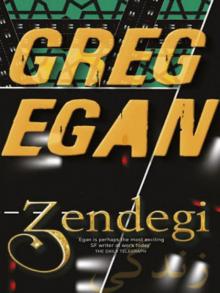 Zendegi
Zendegi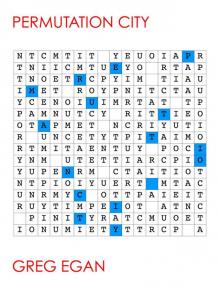 Permutation City
Permutation City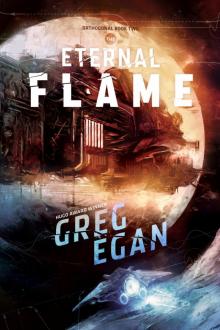 The Eternal Flame
The Eternal Flame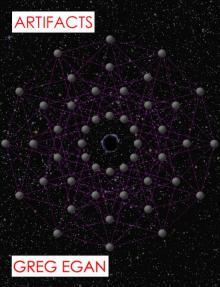 Artifacts
Artifacts Wang's Carpets
Wang's Carpets Dichronauts
Dichronauts Incandescence
Incandescence Teranesia
Teranesia Schild's Ladder
Schild's Ladder Quarantine
Quarantine The Four Thousand, the Eight Hundred
The Four Thousand, the Eight Hundred The Clockwork Rocket
The Clockwork Rocket Zeitgeber
Zeitgeber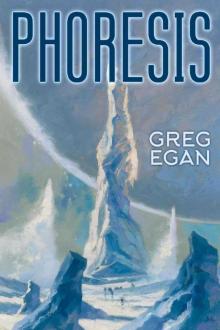 Phoresis
Phoresis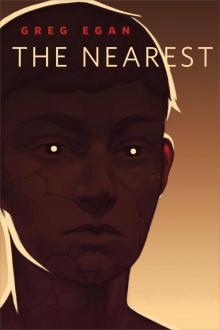 The Nearest
The Nearest Diaspora
Diaspora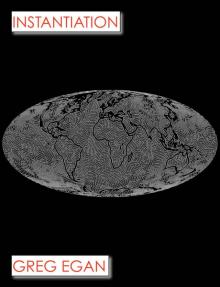 Instantiation
Instantiation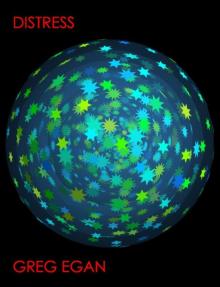 Distress
Distress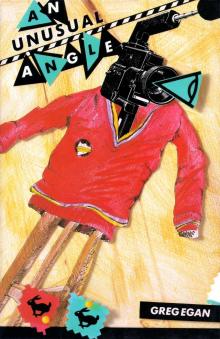 An Unusual Angle
An Unusual Angle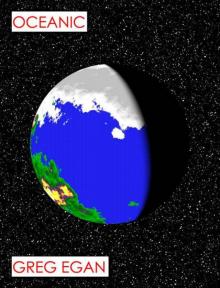 Oceanic
Oceanic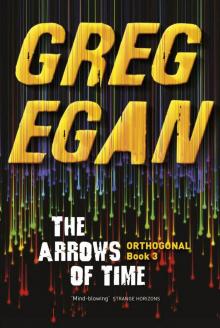 The Arrows of Time
The Arrows of Time Axiomatic
Axiomatic![Anthology 2. Luminous [1998, 2010] Read online](http://i1.bookreadfree.com/i/03/18/anthology_2_luminous_1998_2010_preview.jpg) Anthology 2. Luminous [1998, 2010]
Anthology 2. Luminous [1998, 2010]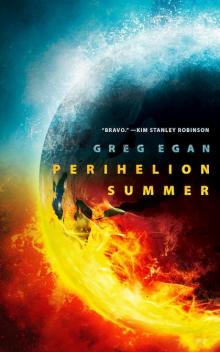 Perihelion Summer
Perihelion Summer Luminous
Luminous